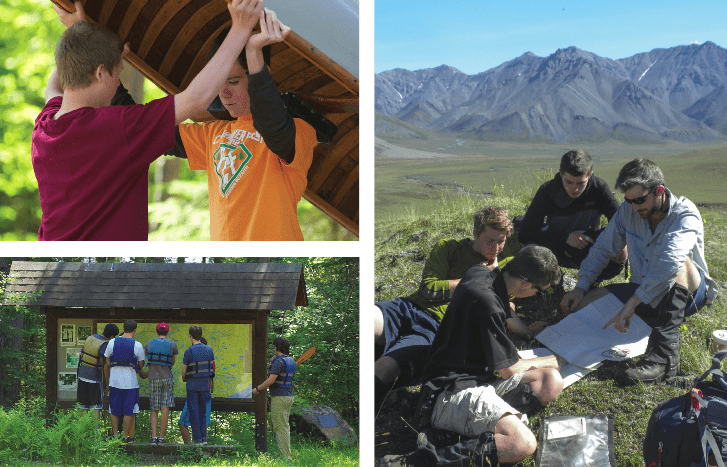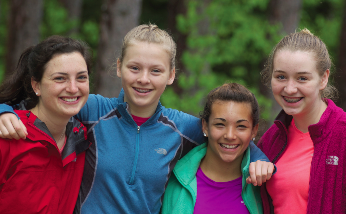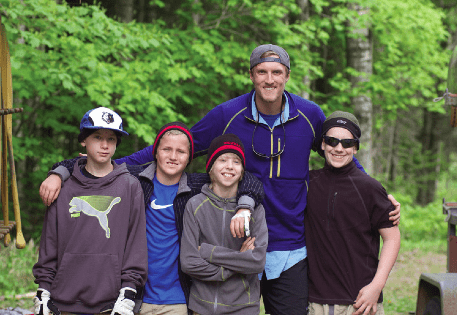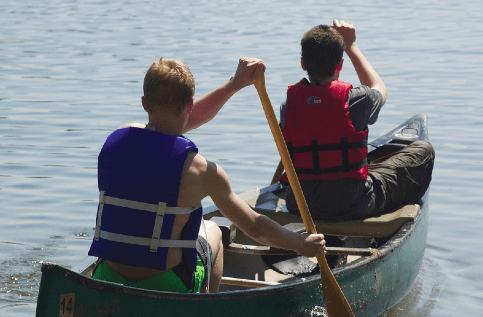On the pine-covered shores of Burntside Lake’s North Arm twenty miles northeast of Ely, Camp Widjiwagan has been a launching point for teenagers to explore wilderness since 1929. Today, some families are sending their fourth generation of campers to Widji, where the fundamental experience hasn’t changed much since their grandparents’ days.

The camp still uses the wood-canvas canoes, still keeps the groups small, and still teaches kids to respect themselves, their equipment, and the wilderness.
The wood-canvas canoes have long been one of the camp’s fundamentals. The handmade crafts demand respect, says Joe Smith, caretaker at Widjiwagan for the past 25 years and a former camper and counselor.
“For a wood canvas canoe to complete a journey successfully, you have to learn how to use the canoe in such a way it doesn’t get beat up, by being dragged on shore for example. Kids and counselors learn to take a lesson from that canoe and apply it to other aspects of the trip as well,” Smith says.
Many of Widjiwagan’s canoes were built by Joe Seliga, a close friend of the camp and a world-renowned craftsmen. He attended many homecoming banquets and, before he passed away in 2005, Seliga gave his canoe form to the camp so they could keep making his design.
“When Joe gave us his form, he said, ‘I want you to make canoes that will go on trail with 12-year-old kids,’” Widjiwagan’s executive director Liz Flinn says.
After his passing, the camp built a new canoe workshop to continue making the canoes for use by campers, and to maintain its fleet. Smith says that at least one of the canoes he used as a camper four decades ago – an Old Town wood-canvas – is still in regular use today.

The canoes are at their essence a means for transportation through the wilderness, which offers many other lessons to young men and women. John Bussey went through the program as a camper, and then worked seven years as a counselor. Today, he is a member of the camp’s board of directors, and works in environmental conflict resolution – a career clearly influenced by his Widjiwagan experiences.
“The most important skills I learned at Widji were the interpersonal skills, far more important than any wilderness skills like hiking or paddling. You can’t avoid conflicts, and you have to make decisions collaboratively,” Bussey says.
Widji’s small groups, which are usually five to six campers and one counselor, naturally encourage close relationships. Campers typically go on their first trip when they’re 12 years old, when the kids have no choice but to work together.
“When you have a small group, you have to work together, you’re not going to get over a portage alone,” says executive director Flinn.
Flinn says the wilderness is the ideal environment for teaching such cooperation. Campers learn to think of other people, supporting them with words or help. Three kids might work together to flip a canoe and get it on their shoulders for portages, and the relationships are important.
“For a lot of the boys, it shows what positive male friendship can be like, supportive rather than competitive. For girls, it shows a lot of female role models who are physically strong, confident, and competent,” Flinn says.
The teamwork begins before they even get their paddles wet. Camp caretaker Smith says an important part of the collaboration is the trip planning.
“A big component of what makes it special is that when kids come to camp, the philosophy includes doing training that also serves as team-building, friendship-building, and the kids have a real personal attachment to the trip that they go on because of the training and they get to help plan the menu and the route,” Smith says.

When Widji was founded by the St. Paul YMCA in 1929, it offered traditional summer camp activities like arts and crafts and tennis, in addition to canoe trips. It was in the 1950s that the board of directors decided to focus on wilderness camping.
Flinn says that it was around that time that the camp also started offering girls trips, which were initially led by male counselors – but not for long. The camp soon hired female leaders.
“Widji was really at the forefront of having women lead girls into the wilderness,” she says.
In the 1970s, backpacking was added to the canoeing curriculum, and an environmental education program was developed. In the summer of 2013, the camp sent out 152 trips for both canoeing and backpacking, with 658 campers total.
During the fall, winter and spring, Widjiwagan welcomes school groups for its environmental education courses. Students enjoy recreation and education, with topics like Ojibwe Heritage, Glacial Geology, and The Night Sky, alongside instruction in using a map and compass, cross-country skiing, and other outdoor skills.

At its core, what defines Widji is something that hasn’t changed: remote wilderness trips with small groups. Board member John Bussey says it was that experience that changed his life.
“I think the most definitional day I ever had was doing the Grand Portage through Widji,” Bussey says. “Sixteen-year-olds typically end their Explorer trip with the nine-mile Grand Portage. I was not popular by any stretch of the imagination in high school, I had very low self-confidence. Being forced into a group that learned to work together, and put to a final test on the last day of this three-week trip to do a nine mile portage, it was the most intense thing I’ve ever done. It completely altered my perspective of myself. If I put my mind to it, and I’m in a team which is mutually supporting, we can accomplish things we never would have dreamed possible.”
For more information: www.ymcatwincities.org/camps/camp_widjiwagan/
This article originally appeared in the Fall-Winter 2013 Wilderness News Magazine

